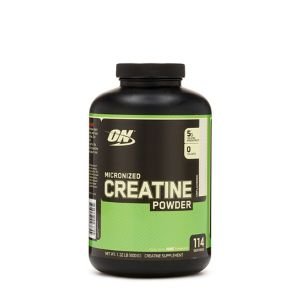The Definitive Guide to Creatine: Harnessing the Strength of a Powerful Supplement
The world of fitness supplements can be confusing, filled with countless products and loads of misinformation. Today, let's dive into one misunderstood but highly effective supplement - Creatine. We'll demystify Creatine, exploring its benefits, the best type to buy, and the ideal dosage to optimize your fitness goals.
Understanding Creatine: More Than Just a Supplement
Creatine, an amino acid naturally produced in our bodies, plays a key role in energy production during high-intensity exercise. It works by refilling the primary source of energy in our bodies - adenosine triphosphate (ATP), which helps delay fatigue and enhance performance. This is why it's a favorite among athletes and fitness enthusiasts.
Creatine also contributes to cell volumization, leading to larger and stronger muscle cells. As a result, it improves strength, power, and endurance, making it an excellent supplement for muscle growth.
The Amazing Benefits of Creatine
Creatine is a powerhouse supplement with a range of benefits:
Muscle Growth: Creatine supplementation increases lean body mass and muscle size.
Strength and Performance: It aids in enhancing power output and strength during high-intensity workouts.
Endurance: By delaying muscle fatigue, Creatine allows for longer workout sessions, boosting endurance.
Cognitive Benefits: Emerging research suggests that Creatine might even enhance cognitive function, although more research is required in this area.
Higher brain creatine levels have been linked to better neuropsychological performance. Creatine supplementation can even improve cognitive processing hindered by sleep deprivation or natural aging.
Choosing the Right Creatine: The Monohydrate Magic
With various forms of Creatine available, the most effective and cost-effective option is Creatine Monohydrate. It's backed by extensive research and has shown to fully saturate muscle cells with Creatine, ensuring optimal performance.
Furthermore, it's significantly cheaper than other forms and it's the only form that completely saturates the muscle cells, making it an excellent choice for regular supplementation.
Consuming Creatine: When, How, and How Much?
It's recommended to take Creatine every day, whether it's a workout day or not. Although research suggests that consuming it post-workout might be slightly more beneficial, the difference is minimal.
As for the quantity, a daily dosage of 0.045g per pound of body weight is recommended. Remember, consuming more Creatine doesn't enhance the benefits; excess Creatine is simply excreted by the body.
There are two popular strategies for Creatine intake:
Loading Strategy: This involves consuming 25g/day for a week to rapidly saturate muscle cells with Creatine, followed by a maintenance dose of 5-10g/day. However, this might lead to minor gastrointestinal discomfort and bloating in some individuals.
Conservative Strategy: This involves a steady intake of 5-10g/day. It's a gentler approach and is typically recommended for long-term usage.
While both strategies are effective, I generally advise my clients to follow the conservative strategy for a more comfortable experience.
Dispelling the Myths
With any supplement, misconceptions are bound to arise. Let's debunk some common myths about Creatine:
Weight Gain and Water Retention: Creatine may increase body weight due to extra water retention linked to additional glycogen storage. This "water weight" is stored within muscle cells, improving the appearance of one's physique - which is what we want as fitness enthusiasts. Unless you're a weight-class restricted athlete, the possibility of weight gain from creatine should not discourage you.
Kidney Problems: A common myth suggests that Creatine supplementation can harm the kidneys. While Creatine does slightly raise creatinine levels (a waste product), there are no negative impacts on kidney function for healthy individuals, as long as the proper dosage recommendations are followed. If you have a history of elevated creatinine levels or kidney dysfunction, consult your doctor or dietitian before beginning a supplementation program.
Creatine for Women: Creatine is beneficial for everyone, including women.
Creatine and Hair Loss: There's currently no solid evidence to suggest that Creatine supplementation causes hair loss. However, if you're predisposed to hair loss, it's always wise to consult with a healthcare professional before starting any supplement regimen.
Creatine as an Anabolic Steroid: Creatine is far from being an anabolic steroid. Its mechanism of action and effects are vastly different from those of steroids. It's a legal supplement and is not on the World Anti-Doping Agency's (WADA) list of banned substances for professional athletes.
Creatine from Meat: While creatine can be found in trace amounts in meat and fish, a high protein diet alone won't provide enough creatine to achieve its full benefits. Hence, the recommendation is to supplement with 0.045g/lb of body weight a day.
Gastrointestinal Discomfort and Bloating: Some individuals report gastrointestinal discomfort and bloating with creatine consumption. Although this is not a common side effect, more conservative strategies, such as avoiding a "loading phase," may help mitigate this issue.
The Bottom Line
Creatine monohydrate has proven to be a safe, effective, and economical supplement that can enhance your fitness journey. With a recommended daily intake of around 5g, you can enjoy its myriad of benefits, from improved strength and endurance to muscle growth. As with all supplements, it's essential to listen to your body and consult with a healthcare professional if you have any pre-existing conditions. So, here's to your health and fitness - powered by Creatine!

